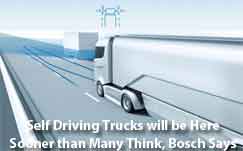Probably some relatively small percentage of US motorists will recognize Bosch as the name of a supplier of parts of various kinds to the auto industry.
Before long, the brand may become much better known as being a key player in the development of technologies that power autonomous passenger cars and freight trucks.
Supply Chain Digest Says... |
 |
| Bosch is convinced that fully autonomous commercial vehicles will be operating on US highways sooner than most people expect, as the technical advances just keep coming. |
 |
What do you say? |
| Click here to send us your comments |
 |
| Click here to see reader feedback |
|
|
That as the company held an open house showcasing its technology progress last week at what Bosch called the Mobility Experience US 2018, held at the Bosch Proving Grounds site outside Detroit.
As reported by Heavy Duty Trucking magazine, while most of the news systems for autonomous vehicles were featured for use on cars, almost all are likely to make their way to trucks soon as well.
And Bosch is very bullish indeed on the prospects for self-driving trucks.
Jason Roycht, vice president, North America regional business leader for commercial vehicle and off-road, said the first fully autonomous trucks are likely to operate from hubs based outside major population centers such as Los Angeles, Las Vegas, Denver, Salt Lake City and others.
"If we lay out a logical hub-to-hub system separated by 200 to 600 miles, we could start developing the infrastructure needed to switch from regional trucks to automated linehaul," Roycht said. "Those hubs would become natural stations for fueling whether it's an electric charging station or a hydrogen distribution center."
Among the technologies featured at the Bosch event were the latest developments in advanced driver assistance systems (ADAS) – stepping stones on the pathway to automated driving. ADAS has been a major growth driver for Bosch, as the company expects to generate sales of 2 billion euros globally from ADAS systems, which tie together sensors and reactive driving systems.
That includes something Bosch calls AEB Cyclist, which uses sensors to detect cyclists alongside and ahead of the vehicle, monitoring speed, distance and direction of travel to calculate the risk of a collision. In the case of an imminent collision, the system automatically brings the vehicle to a stop to avoid or reduce the severity of an accident.
Bosch also featured another highway assist system, a partially automated driving function installed in a 2018 Maserati Ghibli. It combines "stop & go"
and lane centering functions to control the vehicle's speed, acceleration and braking.
Key to autonomous car and truck success will be redundant systems to guard again failures, Bosch says.
(See More Below)
|
CATEGORY SPONSOR: SOFTEON |
|
|
| |
|
|
 For example, the company showed a redundant braking system that combines Bosch's electromechanical brake booster (called iBooster) and electronic stability control (ESP) systems, each of which is capable of independently performing braking functions for the vehicle in the rare case of a single failure. For example, the company showed a redundant braking system that combines Bosch's electromechanical brake booster (called iBooster) and electronic stability control (ESP) systems, each of which is capable of independently performing braking functions for the vehicle in the rare case of a single failure.
And Bosch's Servolectric Paraxial Servo Unit (EPSapa) also provides redundancy that activates steering in the event the primary system is unable to operate.
Bosch is even testing systems that use wireless connectivity to provide sensing beyond line-of-site limitations. For example, the company's V2X technologies achieve beyond the line-of-sight sensing by facilitating communication between vehicles and sensors ahead in the road. This gives drivers information and more time to react to potentially dangerous situations in scenarios such as left turns and pedestrians in intersections – and will soon provide autonomous vehicles with the data they need for advanced decision-making earlier in the driving process.
Bosch is convinced that fully autonomous commercial vehicles will be operating on US highways sooner than most people expect, as the technical advances just keep coming.
What do you think of Bosch's technology and predictions? Are we close to true autonmous vehicles? Let us know your thoughts at the Feedback section below.
Your Comments/Feedback
|
|
Ernest Miller
Managing Partner, OPTIO TEMPORE |
Posted on: May, 31 2018 |
|
| Agree with the author - Hub to Hub heavy trucks is a great early application for driverless technology. Excellent cost savings and safety improvment. |
|
|